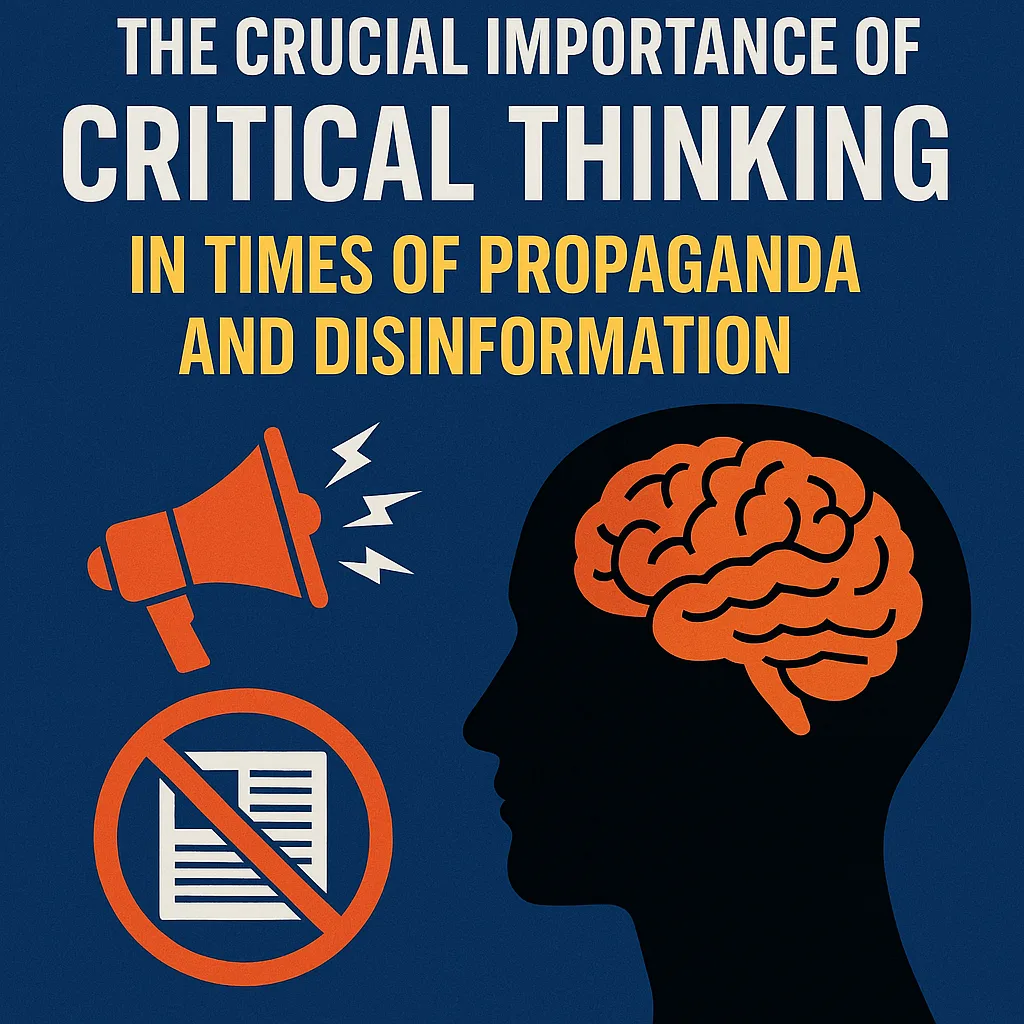
Critical thinking is the ability to objectively analyze and evaluate information or arguments by questioning assumptions, identifying biases, and reasoning logically—ultimately leading to well-informed decisions and deeper understanding.
Albert Einstein once said, “The important thing is not to stop questioning. Curiosity has its own reason for existing”—a truth that lies at the heart of critical thinking, our most vital tool in navigating today’s complex world.
The Information Flood: A Blessing and a Threat
We’re living in the most connected Era in human history. Information flows freely, instantly, and globally—just a swipe away. Yet with this digital abundance comes a serious threat: disinformation. It seeps into our newsfeeds, inboxes, and group chats, often disguised as credible content. The danger? We can drown in a sea of half-truths before realizing we’re even wet.
Propaganda in the Digital Age: Faster, Sharper, Harder to Spot
Propaganda has always been a part of power. From Caesar’s decrees to Cold War cinema, shaping public opinion was an art-form—and a weapon. But today’s propaganda is different. It’s algorithmically curated, socially viral, and often invisible. Bots can sway public mood. Troll farms can start political fires. One tweet can ignite a nation. That’s why critical thinking is no longer optional—it’s a survival skill.
What Critical Thinking Really Means Today
More Than Just “Thinking Hard”
Critical thinking isn’t about being skeptical of everything. It’s about processing information with care, depth, and logic. It’s asking: Is this true? Who benefits? Where’s the proof?
Here are 5 powerful reasons why critical thinking is important:
- Cuts Through Disinformation
It helps you distinguish fact from fiction in a world flooded with propaganda, fake news, and biased narratives. - Strengthens Decision-Making
By evaluating options logically and objectively, critical thinking leads to better personal, professional, and societal choices. - Encourages Lifelong Learning
It fuels curiosity, questions the status quo, and opens the mind to new perspectives and deeper truths. - Promotes Independence
Critical thinkers don’t blindly follow opinions—they develop their own reasoned conclusions and stand by them. - Builds Resilience in Crisis
In uncertain or high-pressure situations, critical thinking provides clarity, helping individuals stay calm, analyze risks, and act wisely.
Core Skills Every Modern Thinker Needs
- Observation – Spotting inconsistencies and red flags
- Analysis – Breaking complex issues into clear components
- Inference – Drawing sound conclusions from available evidence
- Evaluation – Weighing the credibility of claims and sources
- Problem-solving – Responding intelligently, not reactively
These aren’t just academic exercises. They’re defenses against manipulation.
Same Old Tricks, New Platforms
A Quick History of Propaganda
Propaganda didn’t start with social media. It’s as old as empires. The Roman Empire glorified conquest with marble and verse. In the 20th century, it took form in leaflets, broadcasts, and film reels. Today, it travels at the speed of light—and it’s personalized.
Why Social Media Supercharges Disinformation
Modern platforms reward engagement, not accuracy. The more outrageous a post, the more likely it is to spread. That’s how lies outrun facts. Algorithms don’t care about truth—they care about clicks.
The Psychology of Belief: Why Smart People Fall for Fake News
Cognitive Biases That Cloud Our Judgment
Even the most educated minds fall prey to mental shortcuts. We all carry biases like:
- Confirmation bias – Favoring info that aligns with what we already believe
- Availability bias – Trusting what’s easiest to recall, not what’s most accurate
- Bandwagon effect – Believing something because others do
Fake News Feeds Emotion, Not Reason
Disinformation works because it hits where we’re most vulnerable—our emotions. Fear, anger, hope—they bypass critical thinking and go straight to the gut.
Misinformation vs. Disinformation: Know the Difference
- Misinformation: Wrong info shared by mistake
- Disinformation: False info shared on purpose, to deceive
Example:
Your uncle shares a fake cure for COVID-19? That’s misinformation.
A bot account spreading political lies during wartime? That’s disinformation.
Media Literacy: Your Armor Against Manipulation
Think Like a Fact-Checker
Media literacy isn’t about distrust—it’s about discernment. A media-literate person:
- Verifies the source
- Looks for emotional manipulation
- Compares reports from different outlets
- Understands how content is crafted and targeted
Why It Matters
Without media literacy, propaganda wins. With it, we build a public that’s harder to deceive—and stronger in discourse.
Practical Tools to Cut Through the Noise
Fact-Checking Resources That Work
Critical Questions to Ask
- Who created this and why?
- What’s the evidence?
- Is it backed by multiple sources?
- Does it provoke more emotion than reason?
Why We Must Teach Thinking—Early and Often
In Schools: The Frontline of Defense
Education should do more than pass on facts. It should train minds to challenge them. Students need tools to:
- Distinguish fact from opinion
- Debate respectfully
- Make decisions grounded in logic
In Policy: Supporting the Right to Know
Governments can help by:
- Funding media literacy programs
- Regulating deceptive political ads
- Supporting independent journalism
A Thinking Citizenry Makes Democracy Stronger
Critical thinking strengthens democracy in three ways:
- Resists manipulation – Emotionally charged rhetoric loses power
- Strengthens elections – Informed voters make informed choices
- Defends liberty – A free mind is the greatest check on tyranny
Why Critical Thinking Matters in Times of Crisis
Pandemics. Wars. Political Unrest.
In chaotic moments, misinformation multiplies. During COVID-19, critical thinkers relied on WHO, not WhatsApp. In wartime, they verify sources before sharing footage. Calm minds save lives.
Barriers to a Critical Thinking Culture
- Social media algorithms favor echo chambers
- Polarization pushes us into ideological bubbles
- Tribalism makes disagreement feel like betrayal
Breaking out of these traps requires courage—and community.
Responsibility of Influence: Do No Harm
Truth Over Clicks
Influencers and journalists must resist the temptation to go viral at any cost. Every post carries power. Every repost can heal—or harm.
Demanding Accountability
Fact-checkers, pressure campaigns, and transparent moderation policies are crucial in holding digital voices responsible.
Habits to Build a Sharper Mind
- Read outside your bubble
- Pause before you post
- Ask questions daily
- Keep a thinking journal
Curiosity and humility are your greatest allies.
The Double-Edged Sword of Technology
AI and deepfakes complicate the information war. But they can also help fight it.
- AI can flag fake content
- Tools can trace source reliability
- Platforms can surface verified info
Tech is a tool. How we use it—that’s on us.
A Global Fight, A Shared Responsibility
Nations and organizations are fighting back:
- EU Code of Practice on Disinformation
- UN-backed counter-disinfo frameworks
- Fact-checking coalitions like the IFCN
Campaigns like #ThinkBeforeYouShare are helping citizens everywhere get wiser—and louder.
Frequently Asked Questions
Q: What’s the difference between critical thinking and just being skeptical?
A: Skepticism questions everything. Critical thinking evaluates with reason.
Q: How do I teach my kids to think critically?
A: Encourage questions. Explore many views. Let them solve real-life problems.
Q: Can social media be used for good?
A: Absolutely. Follow credible sources. Create dialogue—not division.
Q: What’s the role of schools in this?
A: They lay the foundation for reason, empathy, and media literacy.
Q: Why do intelligent people fall for fake news?
A: Because intellect isn’t immunity. Emotions and biases can cloud any mind.
Conclusion: A Culture of Thought Is a Culture of Strength
In a world flooded with noise, thinking critically is a revolutionary act. It shields us from manipulation, sharpens our decision-making, and protects the integrity of our democracies. If we want a future built on truth—not fear—we must choose to think deeper, speak wiser, and lead by example.

